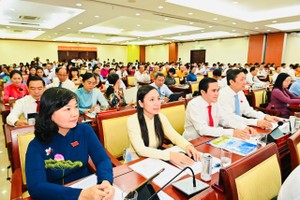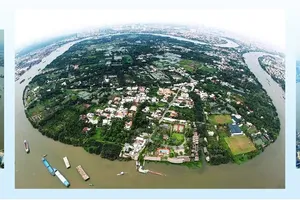The city plans to implement administrative procedures independent of jurisdictional boundaries by the end of 2025.
In an interview with Sai Gon Giai Phong Newspaper, Ms. Vo Thi Trung Trinh, Director of the Ho Chi Minh City Digital Transformation Center, outlined the city’s roadmap, key challenges, and strategic solutions to achieving this ambitious goal.

During the first three days of implementing the two-tier local government model on July 1–3, Ho Chi Minh City’s administrative system received a total of 60,277 applications across various sectors. Of these, 17,744 were submitted online and 42,527 in person.
At the commune level alone, 28,236 applications were processed, including 10,186 submitted online and 18,047 in person. Meanwhile, the city's document management system recorded 782 outgoing documents and 32,092 incoming documents from over 168 wards, communes, and the special zone.
These figures showed that approximately one-third of citizens opted to complete administrative procedures online in the early stages of implementation. Ho Chi Minh City currently offers 344 fully online public services. Firstly, the Ho Chi Minh City Digital Transformation Center is advising the municipal People’s Committee to review and select services from this group to identify and announce a list of administrative procedures that can be processed regardless of geographic or jurisdictional boundaries. Priority will be given to services frequently used by citizens in order to enhance convenience and reduce administrative costs for the public. By the end of 2025, Ho Chi Minh City will implement 2,238 administrative procedures independent of jurisdictional boundaries.
The Ho Chi Minh City Digital Transformation Center is currently reviewing 982 administrative procedures that meet the criteria for fully online public services, a key foundation for implementing the city’s borderless public administration services.
The city’s public service units will equip and deploy devices and applications to digitize submitted documents, converting them into legally valid electronic records.
In addition, Ho Chi Minh City plans to introduce supportive policies that allow citizens and businesses to access online services anytime, anywhere. This includes budget allocations to assist with costs related to guidance, submission, and document digitization. This approach builds on earlier initiatives, such as the zero-fee policy for 98 online administrative procedures, which has already been rolled out citywide to encourage public adoption of digital services.

One of the greatest challenges in implementing administrative procedures independent of jurisdictional boundaries lies in public administration reform and data infrastructure.
To eliminate jurisdictional dependency, a comprehensive and accessible data system is essential, enabling public servants to retrieve and utilize citizen and business information from any location, regardless of geographic boundaries.
Transitioning from traditional workflows to a digital environment, shifting from paper-based records to electronic documents, and data mining require time and adaptation.
To overcome these challenges, it needs to accelerate administrative reform, eliminate redundant paperwork, and shift toward data-driven governance by utilizing existing databases to verify and process information.
Once these issues are addressed, receiving and processing administrative procedures from any location will become significantly more efficient. Ho Chi Minh City currently operates a centralized administrative system, meaning that once a case is digitized and converted into an electronic record, it can be accessed and handled by any competent authority across the city.
For example, a request submitted in Con Dao Special Zone can be digitized and seamlessly forwarded to relevant departments in Ho Chi Minh City for processing and resolution.
In addition, the city plans to roll out new solutions for service delivery, including smart kiosks that can read data and digitize documents, enhancing both accessibility and convenience for users.
At present, businesses find it easier than individual citizens to access and utilize online public services. Statistical data shows that the proportion of online administrative submissions from enterprises is significantly higher than that of individuals. This disparity highlights a gap in the adoption of e-government services among citizens.
To address this gap, the city will implement support measures, including the production of short instructional videos to promote and guide citizens in using online administrative services.
Additionally, Ho Chi Minh City will expand the role of community-based digital technology teams and youth volunteer networks and potentially establish official e-government service agencies to assist the public.
The city also aims to build on the success of its digital literacy for all people movement by strengthening grassroots support networks — particularly to assist elderly residents, and those in remote, rural, or island communities who may have limited exposure to digital technologies.
Ho Chi Minh City is currently building a modernized Two-Tier Administrative Service Center, designed with a citizen- and business-centric approach at its core. The city is offering multiple channels for receiving, processing, and delivering the results of administrative procedures, including in-person services at one-stop public service counters, online submissions via the National Public Service Portal, and through the public postal service.
























